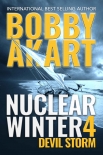Nuclear Winter Devil Storm by Bobby Akart (great novels txt) 📗

- Author: Bobby Akart
Book online «Nuclear Winter Devil Storm by Bobby Akart (great novels txt) 📗». Author Bobby Akart
The Greeks who inhabited Tarpon Springs, especially those who’d remained true to their heritage, had a knack for preparing for catastrophic events. The shoreline from Anclote Key around the Big Bend just south of Tallahassee all the way to Apalachicola was frequently visited by hurricanes every season. As a result, regardless of the time of year, they prepared and stored food in anticipation of a long-term power outage.
The Andinos were willing to share their food and drink, their homes, and their knowledge of sailing under dangerous conditions. After dinner they shared a toast with their guests by filling shot glasses with ouzo, a licorice-tasting spirit enjoyed by Greeks around the world. Andino explained to his guests the importance of ouzo to Greek culture as being akin to wine to the French, vodka to Russians, and tequila to Mexicans.
Even Tucker tried a sip. As it burned going down his throat, he swore he’d never touch a drop of alcohol for the rest of his life. Lacey smiled and thanked her hosts for discouraging her teenage son from partaking in the future.
After the table was cleared, the shot glasses were filled with another round, and each of the men lit up a Marlboro, an American cigarette that was wildly popular in Greece. Because the families had such strong ties to the country of their ancestors, they were hugely influenced by Greek pop culture right down to their smoke and drink of choice.
Lacey had politely waited until after dinner so as not to offend her host. However, she was anxious to learn more about a possible hurricane to their south. Was it just a rumor, or did somebody have firsthand knowledge? Were they broadcasting the weather over the emergency stations? If a storm was brewing, should she and Tucker wait it out in Tarpon Springs?
“Do you mind telling us what you’ve heard about a storm?” Lacey asked, looking at the men, who were settled into their chairs around the large dining table.
Andino’s oldest sibling, his brother Sandros, explained, “We’ve had an agreement with our fellow sponge fishermen to share the burden of bringing food in for our families. Mostly, we focus off nearby Anclote Key, where snook and mullet are abundant. We try to conserve fuel on our fishing runs, so we bait up-current of the drop-offs near Clearwater. Rooker Island has been a great location for mackerel and snapper.
“Anyway, you have to understand that it’s hard to keep our old sea captains on dry land. They don’t care about nuclear wars or economic collapse or fuel shortages. As far as they’re concerned, they’ve got a job to do, and they’ll always find a way.
“They do, however, worry about storms. Many trust the weather reporting from NOAA and the news networks. Others trust their own instincts and years of experience to sense changes in barometric pressure, winds, and even the color of the water.”
Andino laughed. “To most of these guys, our way of relying upon meteorological reports about wind intensity, pressure, and predictive storm tracks is for the weak.”
Sandros slapped his brother on the shoulder. “They’d rather get swamped than listen to some fool on the Weather Channel, right?”
Andino winked and sipped his ouzo.
Sandros leaned back in his chair and addressed Lacey. “You grew up on the water, right?”
“Technically, an island. Driftwood Key is small, one of hundreds in Monroe County. It’s still an island.”
He continued. “You’ve probably heard some of these old sayings like red sky in the morning, sailors take warning. Followed by red sky at night, sailors’ delight.”
Andino jumped in with another well-known reference about a ring around the moon. “To the old-timers, a ring around the moon was an indication that a storm could be coming. We know, of course, that a lunar corona could be caused by many factors and isn’t necessarily a harbinger of a storm.”
Lacey had become impressed with the Andino brothers as she listened to them. They were experienced and learned. Sponge fishing was their job, and their most valued asset was their boat. They’d schooled themselves in order to prevent a catastrophe while at sea.
Sandros added, “Before satellite imagery and hurricane hunter airplanes came around in the last sixty years or so, boat captains relied upon radio reports from other vessels at sea. Before that, they used barometers. The problem back in the day was that the best you could do was have a few hours’ warning that a storm was imminent. Also, you had no idea how intense it might be, which gave you little time to take action.”
Tucker, who’d been listening intently to the conversation, chimed in, “Unless something is different farther south, we can’t see signs like red skies in the morning or rings around the moon. It’s one continuous sky of gray.”
“You’re correct, which is why our friends have placed such a heavy emphasis on their barometers,” said Sandros. “I’m not talking about the electronic kind, either. Some use a single barometer that ranges from a low of twenty-eight to a high of thirty-one.”
“Twenty-eight? Millibars?” asked Lacey.
Andino explained, “There are two ways to look at atmospheric pressure. One is by measuring inches of mercury, of Hg. The lower the Hg reading, the stormier the conditions. For example, a reading between twenty-eight and twenty-nine equates to roughly nine hundred fifty to nine eighty millibars.”
“Right,” interjected Sandros. “When you see on the news that the weather guy reports the pressure is dropping to those levels, the storm is intensifying.”
“So with a barometer, you don’t really need a weather report,” Tucker opined.
“No, not necessarily,” said Andino as he shook his head. “Your barometric pressure readings are only for your particular location. You could be in the middle of a high-pressure area full of sun, you know, before all of this. Suddenly, a strong low-pressure system could build and bring a drastic




Comments (0)